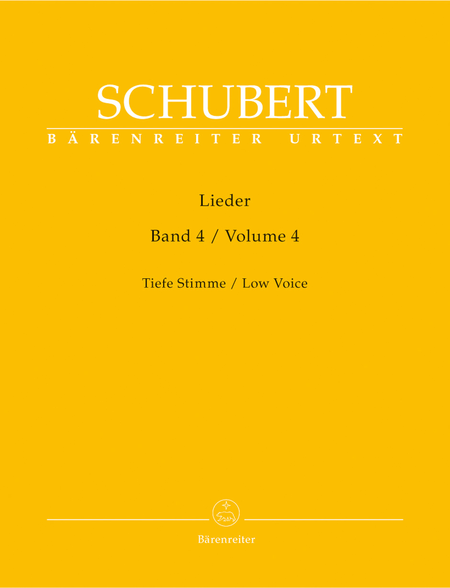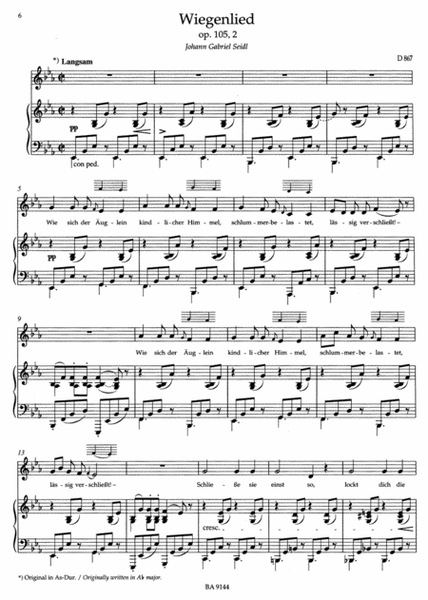Lieder, Volume 4
Low voice (including Schwanengesang D 957)
-
Ships in 1 to 2 weeks
Details
Description
SKU: BA.BA09144
Low voice (including Schwanengesang D 957). Composed by Franz Schubert. Edited by Walther Durr. This edition: urtext edition. Paperback. Barenreiter Urtext. Low voice. Singing Score, anthology. Baerenreiter Verlag #BA09144. Published by Baerenreiter Verlag (BA.BA09144).ISBN 9790006530755. 30 x 23 cm inches.
Walther Dürr , one of the best-known Schubert scholars, has now edited the fourth volume of songs for high, medium and low voices as a continuation of the new Urtext edition of Schubert Lieder. This contains both the last books of lieder which Schubert himself saw into print together with individual lieder. These were printed during Schubert’s lifetime in little-known sources, in periodicals and almanacs, but were not included by him in lieder volumes or published as works with their own opus number, together with lieder listed in the Deutsch catalogue as “undated” (D 990A to D 990C).
They were mostly written between 1826 and 1828.
The best-known settings in this volume are probably the fourteen lieder D 957 and D 965A drawn together as ‘Schwanengesang’ to poems by Ludwig Rellstab, Heinrich Heine and “Die Taubenpost” by Johann Gabriel Seidl. As this was Schubert’s last major composition, the collection, posthumously published by Haslinger at the beginning of May 1829, later acquired the name ‘Schwanengesang’, the name traditionally given to an artist’s last work.
About Barenreiter Urtext
What can I expect from a Barenreiter Urtext edition?
MUSICOLOGICALLY SOUND
- A reliable musical text based on all available sources
- A description of the sources
- Information on the genesis and history of the work
- Valuable notes on performance practice
- Includes an introduction with critical commentary explaining source discrepancies and editorial decisions
... AND PRACTICAL
- Page-turns, fold-out pages, and cues where you need them
- A well-presented layout and a user-friendly format
- Excellent print quality
- Superior paper and binding
Song List (53)
- Widerspruch op. 105, 1 D 865
- Wiegenlied op. 105, 2 D 867
- Am Fenster op. 105, 3 D 878
- Sehnsucht op. 105, 4 D 879
- Heimliches Lieben op. 106, 1 D 922
- Das Weinen op. 106, 2 D 926
- Vor meiner Wiege op. 106, 3 D 927
- An Silvia op. 106, 4 D 891
- ueber Wildemann op. 108, 1 D 884
- Todesmusik op. 108, 2 D 758
- Die Erscheinung op. 108, 3 D 229
- Widerschein D 639
- 2. Fassung
- Der Blumen Schmerz op. post. 173, 4 D 731
- An den Tod D 518
- Trost im Liede op. post. 101, 3 D 546
- Der blinde Knabe op. post 101, 2 D 833
- Im Fruehling op. post. 101, 1 D 882
- Der Vater mit dem Kind D 906
- Schiffers Scheidelied D 910
- Das Lied im Gruenen op. post. 115, 1 D 917
- Fruehlingslied D 919
- Eine altschottische Ballade D 923
- 3. Fassung
- Der Wallensteiner Lanzknecht beim Trunk D 931
- Der Kreuzzug D 932
- Des Fischers Liebesglueck D 933
- Lebensmut D 937
- Der Winterabend D 938
- Herbst D 945
- Schwanengesang, D957. Dreizehn Lieder nach Gedichten von Rellstab und Heine:
- 1. Liebesbotschaft
- 2. Kriegers Ahnung
- 3. Fruehlingssehnscht
- 4. Staendchen
- 5. Aufenthalt
- 6. In der Ferne
- 7. Abschied
- 8. Der Atlas
- 9. Ihr Bild
- 10. Das Fischermaedchen
- 11. Die Stadt
- 12. Am Meer
- 13. Der Doppelgaenger
- Die Taubenpost D 965 A
- Der Graf von Habsburg D 990
- Kaiser Maximilian auf der Martinswand in Tirol D 990 A
- Das Echo op. post. 130 D 990 C
- Anhang:
- Widerschein D 639
- 1. Fassung
- Eine altschottische Ballade D 923
- 2. Fassung


 Share
Share